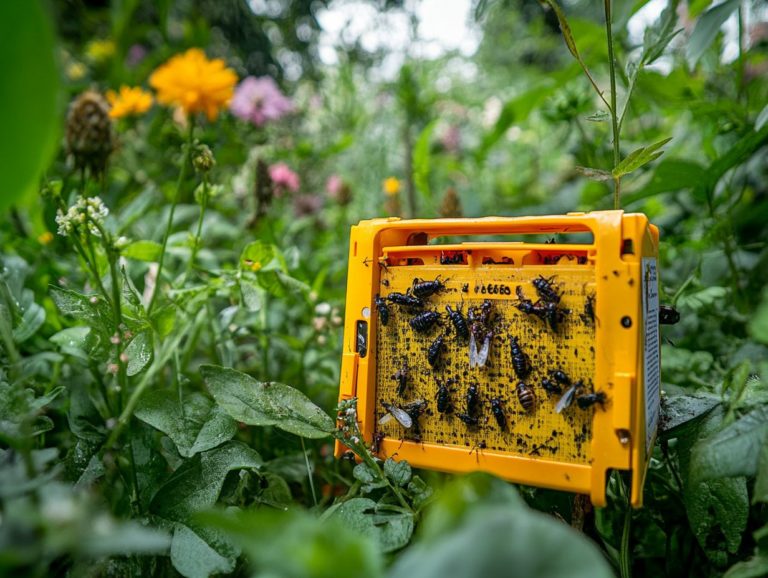Creating a Pest Management Plan for Your Garden
Gardening is a rewarding hobby, but it comes with the challenge of managing pesky pests. Understanding common garden pests is your first step to a healthy garden!
This guide shares effective pest management strategies. You’ll learn how to identify pests and create a pest control plan tailored to your garden.
Whether you prefer eco-friendly solutions or consider chemical options, this guide has valuable tips to help you maintain a flourishing garden. Get ready to cultivate your knowledge and protect your plants!
Contents
- Key Takeaways:
- Understanding Common Garden Pests
- The Importance of a Pest Management Plan
- Creating an Integrated Pest Management Plan
- Natural and Organic Pest Control Methods
- Chemical Pest Control Options
- Implementing and Maintaining Your Pest Management Plan
- Frequently Asked Questions
- What s the best way to manage pests in my garden?
- Why should I create a pest management plan for my garden?
- How do I create a pest management plan for my garden?
- What are some common pests that may affect my garden, and how can I manage them?
- Can I use organic methods to control pests in my garden?
- How often should I update my pest management plan?
Key Takeaways:

- Identify common garden pests for effective management.
- A proactive pest management plan is vital for your garden’s health.
- Develop an integrated plan that combines eco-friendly and chemical methods.
Understanding Common Garden Pests
Understanding garden pests is essential for maintaining a thriving garden and nurturing its ecology. Effective pest management starts with accurately identifying these pests and their life cycles. This allows you to intervene promptly.
Familiarity with seasonal pests gives you the power to prevent issues before they spiral out of control. This proactive approach ensures that beneficial insects and allies in your garden can flourish alongside your plants, supporting biodiversity and fostering robust ecosystems.
Identifying Pests
Identifying and understanding pests is crucial for effective pest management. When you accurately identify pests, you can apply the most suitable control methods tailored to your garden’s needs.
By employing techniques like visual inspections and scouting for signs of pest activity, you can enhance your knowledge of these organisms. Utilizing insect monitoring tools further aids in tracking pest populations over time, enabling you to take proactive measures.
Grasping the dynamics of pest behavior and life cycles empowers you to make informed decisions that specifically target pests while minimizing reliance on harmful chemicals. This holistic approach protects your plants and fosters a balanced ecosystem.
The Importance of a Pest Management Plan
A well-structured pest management plan is essential for any gardener seeking sustainable practices and plant health. This plan serves as your roadmap for creating a pest-free zone in your garden with effective pest control methods tailored to your needs.
Typically, it incorporates integrated pest management strategies that emphasize ecological balance and long-term solutions. This ensures a thriving environment for your plants.
Benefits of Proactive Pest Control
Proactive pest control offers numerous benefits, including enhanced plant resilience, reduced pest damage, and a thriving garden ecosystem that nurtures beneficial insects.
Incorporating regular monitoring and using natural deterrents creates a protective haven for your crops. It also boosts soil health by minimizing chemical dependencies, fostering a diverse community of beneficial organisms.
As a result, watch your productivity soar as your garden thrives! Your plants will experience improved health, and the vitality of the soil, along with its microbial life, will flourish. This leads to heightened overall productivity and sustainability in your garden. Ultimately, by adopting these practices, you contribute to long-term ecological balance and resilience.
Creating an Integrated Pest Management Plan

Crafting a plan that combines different ways to control pests (Integrated Pest Management) is essential for achieving sustainable gardening. This approach merges various pest control methods to manage pest populations effectively while minimizing environmental impact.
An IPM plan considers the entire ecosystem and promotes practices that enhance plant health and support effective habitat management.
Steps to Developing a Plan
Developing an effective pest management plan involves several key steps, including monitoring for pests, identifying issues, and selecting the right natural pest control methods for your garden tailored to your garden’s specific needs.
Effective monitoring is the cornerstone of your success. It helps you catch pests early and prevents infestations from spiraling out of control. By scouting for pests regularly, especially during critical growing periods, you can accurately assess the situation and act when necessary.
Once you’ve identified the pests, implement strategies that align with sustainable gardening practices. Choose environmentally friendly solutions, like biological controls or targeted organic pesticides, ensuring your approach is gentle on the ecosystem.
A well-rounded pest management plan not only addresses immediate concerns but also nurtures a healthy ecosystem. This allows both your plants and beneficial organisms to thrive together.
Natural and Organic Pest Control Methods
Natural and organic pest control methods offer eco-friendly solutions that nurture a healthy garden while reducing dependence on harmful chemicals. Get excited about these practices! You can harness the benefits of organic gardening and explore effective pesticide alternatives, like inviting beneficial insects into your space.
Eco-Friendly Solutions for Pest Management
Eco-friendly solutions for pest management provide an array of non-toxic options that align with sustainable practices. These solutions safeguard your plants and the surrounding ecosystem.
By incorporating techniques like organic fertilizers and composting, you can cultivate nutrient-rich soil that nurtures plant growth while naturally warding off harmful pests. These methods enhance biodiversity and promote beneficial organisms, significantly reducing reliance on chemical interventions.
Implementing cultural controls like crop rotation and companion planting provides dynamic strategies to minimize pest outbreaks.
Together, these practices create a balanced ecosystem, enhancing resilience against infestations and establishing a harmonious environment where flora and fauna can flourish.
Chemical Pest Control Options
While chemical pest control options can be effective for severe infestations, assess their environmental impact. Consider integrating these methods into a comprehensive pest management strategy that emphasizes non-toxic solutions and sustainability.
This holistic approach addresses immediate concerns and fosters a healthier ecosystem in the long run.
Start your own pest management plan today and create a thriving garden!
When and How to Use Chemicals

Understanding when and how to apply chemicals in pest management is essential. Improper use can lead to detrimental environmental consequences and harm beneficial insects.
Timing plays a pivotal role. By applying treatments during specific life stages of pests, you can enhance their effectiveness and reduce the amount needed. It s equally important to consider the weather, as certain conditions can significantly influence the performance of your chemical applications.
Employ targeted spot treatments to minimize unnecessary exposure to non-target organisms, thereby protecting the ecosystem. By integrating chemical controls with biological and cultural practices, you can foster a harmonious approach to pest management.
This balanced strategy will protect your crops and keep your garden thriving while supporting the health of the surrounding environment. Your pest management efforts will remain sustainable, effective, and environmentally friendly.
Implementing and Maintaining Your Pest Management Plan
Implementing and maintaining your pest management plan is crucial for ensuring its effectiveness in controlling pests while nurturing a thriving garden environment. By creating a pest-friendly habitat in your garden and committing to this proactive approach, you safeguard your plants and promote a balanced ecosystem that supports healthy growth.
Tips for Successful Pest Control
To ensure successful pest control, incorporate a range of strategies, including regular pest monitoring, timely action steps, and comprehensive garden maintenance.
By adopting a proactive mindset, you can prevent infestations and tackle potential issues before they escalate. Embrace integrated pest management, combining different methods to control pests effectively.
For instance, using beneficial insects or natural repellents can be your first line of defense. Regularly inspect your garden to monitor pests and spot potential problems early. This enables you to implement swift and targeted interventions that protect both your plants and the surrounding ecosystem.
Frequently Asked Questions
What s the best way to manage pests in my garden?
A pest management plan for a garden is a strategy that outlines the steps and methods for controlling and preventing pest infestations. It includes identifying potential pests, monitoring their presence, and using various techniques to eliminate or reduce their damage to crops or plants. For more detailed guidance, check out this resource on how to create a pest control diary for your garden.
Why should I create a pest management plan for my garden?

Creating a pest management schedule for your garden helps maintain the health and productivity of your plants. By identifying potential pests and implementing effective control measures, you can prevent damage to your crops and reduce the need for harmful pesticides.
How do I create a pest management plan for my garden?
To create a pest management plan, first identify potential pests in your area and research their behaviors. Then, determine the best control methods for each pest and consider creating an integrated pest management (IPM) plan to develop a schedule for monitoring and implementing these methods in your garden.
What are some common pests that may affect my garden, and how can I manage them?
Common garden pests include insects such as aphids, caterpillars, and beetles, as well as rodents like mice and moles. Other pests may include birds, snails, slugs, and various diseases caused by fungi, bacteria, and viruses.
Can I use organic methods to control pests in my garden?
Yes, there are many organic methods for controlling pests in a garden. These include introducing beneficial insects, using physical barriers such as netting or traps, and using natural pest deterrents like garlic or hot pepper sprays.
Ready to start your pest management plan? Let s get started!
How often should I update my pest management plan?
Review your pest management plan regularly. This plan outlines strategies to keep pests under control, so if new pests or diseases appear in your area, it’s crucial to create a soil management plan and make necessary updates.
Re-evaluate your strategies if they aren t working. Keeping your garden pest-free should always be your priority!






